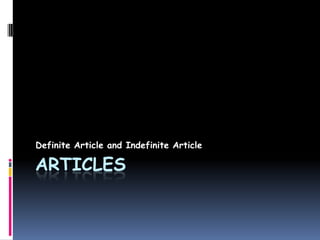
Artigos Definidos e Indefinidos
- 2. IndefiniteArticle a / an Não há nenhuma diferença semântica entre a e an; A diferença quanto à utilização entre a e an é: -> Utilize a quando o substantivo iniciar com som de uma consoante; -> Utilize an quando o substantivo iniciar com som de uma vogal.
- 3. Emprego de A / AN ->Emprega-se a(n) somente com substantivos contáveis singulares; Ex: a book, anapple -> Para identificar ou classificar algo; Ex: It'sa book. / It'sanapple. -> Para definir algo; Ex: A dog is a domestic animal. A lion is a wild animal. -> Para quantificar algo; Ex: I havea book. / I haveanapple
- 4. -> Para se referir a uma certa pessoa que não conhecemos; Ex: A Mr Brown would like to see you. (Um tal Sr.Brown deseja vê-lo.) -> Para falar sobre profissões; Ex: He is adoctor. / She is anactress. -> Para querer dizer somente um/uma; Ex: I'd like a lemon, please. -> Para se referir a algo pela primeira vez; Ex: I saw a car crash into a tree.
- 5. -> Para se referir a uma unidade de medida; Ex: three times aday. -> Para se referir a certas doenças; Ex: I'vegotacold. (Estou constipado.) -> Em exclamações; Ex: Whataday! (Whataday!) Whatamess! (Que desordem!) -> Com certos números; Ex: ahundred, athousand, amillion, acoupleof,, adozen
- 6. DefiniteArticle The Emprega-se o artigo definido the: -> Com substantivos contáveis (singulares e plurais) e com substantivos não-contáveis (que são sempre singulares); Ex:the book, the books. -> Para se referir a algo já mencionado na frase anterior; Ex: I saw a man and a woman yesterday. The man was short and the woman was tall. -> Quando se espera que a pessoa a quem dirigimos saiba do que estamos a referir; Ex:It's hot in here. Could you open the window, please?
- 7. -> Quando algo pode ser identificado a partir de um contexto conhecido entre as pessoas; Ex: I must go to the post office. The beach is full of people. -> Com expressõesquetêm a ver com instrumentosmusicais no singular; Ex:She plays the piano. -> Com expressões que têm a ver com palavras radio, cinema, theatre; Ex:Be quiet! I'm listening to the radio.
- 8. -> Nossuperlativos;Ex: the best book. -> Com numeraisordinais: first, second, third, ... e next, last; Ex:thefirstexercise. -> Com períodos do dia e da noite; Ex: in themorning, in theafternoon, in theevening. -> Para se referir a algo que é único; Ex: themoon, theearth, thesun. -> Com nomes de lugares: arquipélagos, mares, oceanos, cadeias de montanhas, rios, desertos, hotéis, cinemas, galerias, teatros, museus;
- 9. -> Com adjetivos para representar uma classe de pessoas; Ex: theold (os idosos), theBritish (os Britânicos / os Ingleses) -> Com nomes dos jornais; -> Oralmente com datas; Ex: (the) 10th (of) June. -> Com apelidos plurais; Ex: theSmiths (os Smiths / a família Smith) -> Para se referir a indivíduos, instituições, organizações com autoridade; Ex:the Prime Minister (o Primeiro Ministro) -> Para se referir a alguém bem conhecido; Ex: I know Tony Blair, the Prime Minister. (Conheço Tony Blair, o Primeiro Ministro.)
- 10. Exercises Complete o exercício com o artigo indefinido a / an: 1. ____ car 2. ____ dog3. ____ aeroplane4. ____ scientist5. ____ architect6. ____ hour7. ____ house8. ____ honestman9. ____ hundred10. ____ ice cream
- 11. Complete o exercício com o artigo definido the. Se este último não for necessário, utilize o hífen ( - ) 1. ____ moon 2. ____ England 3. ____ Mount Everest 4. ____ trumpet 5. ____ SaharaDesert 6. ____ Brazil 7. ____ Pacific 8. ____ UnitedKingdom 9. ____ Amazon 10. ____ Mount Fuji
